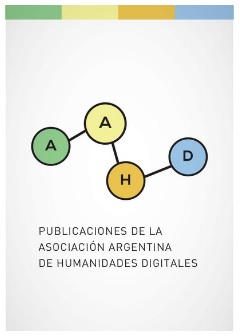El gran reinicio del conocimiento y su impacto en las Humanidades Digitales
DOI:
https://doi.org/10.24215/27187470e034Palavras-chave:
GAFAM, geopolítica del conocimiento, privacidad, datos, Humanidades DigitalesResumo
En este artículo se describe el impacto de GAFAM (Google, Apple, Facebook, Amazon y Microsoft) sobre la educación pública y en general se analiza el cambio de paradigma en la producción y acceso al conocimiento digital. La pandemia de COVID-19 favoreció la expansión de los oligopolios globales y la plataformización de procesos y servicios: información, educación, salud, transportes, alimentación, etc. Al generar efectos de estandarización y homogeneización, estos fenómenos constituyen una amenaza para la diversidad biocultural y paralizan la innovación tecnológica. En este escenario es necesario que las Humanidades Digitales recuperen su papel crítico y reconviertan la originaria pulsión hermenéutica y epistemológica en conciencia política. El objetivo de las HD hoy debería ser defender y fortalecer la variación y la pluralidad cultural, lingüística y epistémica en la dimensión digital.
Referências
Brown, L. X. Z. (16 de noviembre de 2020). How Automated Test Proctoring Software Discriminates Against Disabled Students. Center for Democracy and Technology. https://cdt.org/insights/how-automated-test-proctoring-software-discriminates-against-disabled-students/
Buiatti, M. (2004). Il benevolo disordine della vita. UTET.
Chan, L., Okune, A., Hillyer, R. Albornoz, A, & Posada, A. (2019). Contextualizing Openness: Situating Open Science. University of Ottawa Press. https://ruor.uottawa.ca/handle/10393/39849
Escobar, A. (2014). Sentipensar con la tierra. Nuevas lecturas sobre desarrollo, territorio y diferencia. Ediciones UNAULA. http://www.aibr.org/antropologia/netesp/numeros/1101/110102.pdf
Fiormonte, D. (2017). Digital Humanities and the Geopolitics of Knowledge. Digital Studies/le Champ Numérique, 7(1). DOI: http://doi.org/10.16995/dscn.274
Fiormonte, D. (2018). Per una critica del testo digitale. Letteratura, filologia e rete. Bulzoni.
Fiormonte, D., & Rio Riande, G. del (2022). The Peripheries and Epistemic Margins of Digital Humanities. In O’Sullivan, J. (ed.), The Bloomsbury Handbook to the Digital Humanities (pp. 17-26). Bloomsbury Academic.
Fiormonte, D, & Priego, E. (13 de octubre de 2016). Knowledge Monopolies and Global Academic Publishing. The Toronto School. Then, Now, Next. https://thewinnower.com/papers/4965-knowledge-monopolies-and-global-academic-publishing
Fricker, M. (2007). Epistemic Injustice: Power and the Ethics of Knowing. Oxford University Press.
Gramsci, A. (1997). Socialismo e cultura. Le opere. La prima antologia di tutti gli scritti, ed. A. Santucci. Editori Riuniti.
Innis, H. A. (2008). The Bias of Communication. University of Toronto Press.
Jacob, A. (2021). Punching Holes in the International Busa Machine Narrative. In Kim, D. & Koh, A (eds.), Alternative Historiographies of the Digital Humanities (pp. 121-139). Punctum Books.
Jones, S. E. (2016). The Priest and the Punched Cards. Roberto Busa, S. J., and the Emergence of Humanities Computing. Routledge.
Laird, E., Grant-Chapman, H., Venzke, C., & Quay de la Vallee, H. (3 de agosto de 2022). Report – Hidden Harms: The Misleading Promise of Monitoring Students Online, Center for Democracy and Technology. https://cdt.org/insights/report-hidden-harms-the-misleading-promise-of-monitoring-students-online/
Lawson, Sean (24 de Abril de 2020). Are Schools Forcing Students to Install Spyware that Invades their Privacy as a Result of the Coronavirus Lockdown? Forbes. https://www.forbes.com/sites/seanlawson/2020/04/24/are-schools-forcing-students-to-install-spyware-that-invades-their-privacy-as-a-result-of-the-coronavirus-lockdown/
Maffi, Luisa (ed.) 2001. On biocultural diversity. Linking language, Knowledge and the environment. Washington and London: Smithsonian Institution.
Mirrlees, T, & Alvi, S. (2019). EdTech Inc. Selling, Automating and Globalizing Higher Education in the Digital Age. Routledge.
Pinto, V. (2019). La parte di Tersite. Verità e democrazia dopo la democrazia. Laboratorio dell’ISPF, XVI(9). http://doi.org/10.12862/Lab19PNV
Reiter, B. (ed.) (2018). Constructing the Pluriverse: The Geopolitics of Knowledge. Duke University Press.
Rio Riande, G. del (2022). Digital Humanities and Visible and Invisible Infrastructures. In D. Fiormonte, S. Chaudhuri, & P. Ricaurte (eds.), Global Debates in the Digital Humanities (pp. 247-258). Minnesota University Press.
Sousa Santos, B. de (ed.) (2015). Epistemologies of the South: Justice against Epistemicide. Routledge.
Stiegler, B. (2021). De la démocratie en Pandémie. Santé, recherche, éducation. Gallimard.
Thiong’o, N. w (1993). Moving the Centre: The Struggle for Cultural Freedoms. James Currey.
Vattikonda, N., y Edelson, J. (2020). Big Education is watching you. The Chronicle, October 15, 2020. https://www.dukechronicle.com/article/2020/10/big-education-is-watching-you
Vitali, S., Glattfelder, J. B., y Battiston, S. (2011). The Network of Global Corporate Control. PLoS ONE 6(10). https://doi.org/10.1371/journal.pone.0025995
Yu, J., y Couldry, N. (2020). Education as a domain of natural data extraction: analyzing corporate discourse about educational tracking. Information, Communication & Society, 25(1). https://doi.org/10.1080/1369118X.2020.1764604
Downloads
Publicado
Edição
Seção
Licença
Copyright (c) 2022 Domenico Fiormonte

Este trabalho está licenciado sob uma licença Creative Commons Attribution-ShareAlike 4.0 International License.
Los autores que publican en esta revista están de acuerdo con los siguientes términos:
- Los artículos publicados en la revista se encuentran disponibles en acceso abierto.
- Los autores conservan los derechos de autor y garantizan a la revista el derecho de ser la primera publicación del trabajo al igual que licenciarlo bajo una Licencia Creative Commons Atribución-CompartirIgual 4.0 Internacional (CC BY-SA 4.0), que permite copiar y redistribuir el material en cualquier medio o formato y remezclar, transformar y construir a partir del material bajo los siguientes términos: debe dar crédito de manera adecuada, brindar un enlace a la licencia, e indicar si se han realizado cambios.
- Los autores pueden depositar el trabajo en un repositorio de preprints, postprints, establecer por separado acuerdos adicionales para la distribución no exclusiva de la versión de la obra publicada en la revista (por ejemplo, situarlo en un repositorio institucional o publicarlo en un libro), con un reconocimiento de su publicación inicial en esta revista.
- Se alienta a los/as autores/as a realizar el depósito de datos en SEDICI, o en cualquier otro repositorio de datos de investigación (como Zenodo, donde la AAHD ha creado un repositorio temático para HUMANIDADES DIGITALES), de manera previa a realizar el envío de la contribución a la revista. De este modo, al remitir el artículo solo se deberá indicar la URL donde se encuentran los datos de investigación.


























